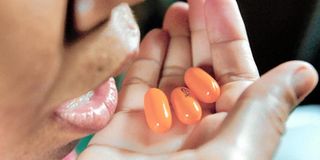State agency allowed in dangerous drugs

Dangerous drugs are falling into the hands of Kenyans because the agency tasked with vetting them has been allowing them in the country. These medicines include generics of popular antibiotics such as amoxicillin, which are used in the treatment of a wide range of infections such as pneumonia. PHOTO | FILE
Dangerous drugs are falling into the hands of Kenyans because the agency tasked with vetting them has been allowing them in the country.
These medicines include generics of popular antibiotics such as amoxicillin, which are used in the treatment of a wide range of infections such as pneumonia.
A Saturday Nation team found the medicines readily available in many pharmacies in Nairobi.
The Pharmacy and Poisons Board, which is mandated to ensure that only medicines that meet the established standards are sold in the country, has been allowing the registration of drugs even after they failed safety tests at the National Quality Control Laboratory (NQCL).
The damning indictment of the board is contained in an audit by the Efficiency Monitoring Unit (EMU) in the Prime Minister’s Office.
Yesterday, the board spent close to three hours in a meeting journalists were barred from covering.
But Medical Services assistant minister Kazungu Kambi, who chaired the meeting, later said it was meant to tackle the challenge of counterfeit drugs.
“There have been these stories we have been hearing from the media that we have counterfeit drugs in the country. And as policy makers, we wanted to address that issue,” he said.
He avoided discussing the claims made in the audit.
“At the moment, the board is a semi-quasi entity and we need to delink it from the ministry,” he said.
The audit report lists drugs which have been registered by board yet they failed NQCL tests.
Standard tests
The tests include checking whether the medicines are soluble, contain the stated active ingredients, hardness standards and signs of breakages.
A medicinal product that fails to meet any or more of the qualities, says the World Health Organisation, is not only a waste of money to the user but could lead to resistance, poisoning and even death.
“A poor quality medicine may contain toxic substances that have been unintentionally added. A medicine that contains little or none of the claimed ingredient will not have the intended therapeutic effect,” says the WHO.
The auditors looked at data on drug analysed by the NQLC between 2007 and last year and that of drugs registered by the board during the same period.
They established that the board was registering medicines despite having been disqualified by the NQCL. It is a legal requirement that any pharmaceutical product imported into the country must be registered with the board after successful analytical tests at the government laboratories.
The audit indicates that one company, Aglowmed EA Ltd, brought in huge amounts of medicines through the Mombasa port despite the manufacturers not meeting the standards.
The law requires that the board inspects the premises of any local or foreign manufacturer willing to sell their products in the local market and ascertain that they meet Good Manufacturing Practice.
The EMU report indicates that medicines, which include injectables, tablets, and syrups, were imported into the country by Aglowmed EA Ltd, all indicated to have been manufactured in India.
Most of them are generics and are readily available in the local pharmacies. One of the drugs, Pancef-O, an antibiotic, costs about Sh700.
Telmi 40/80H, used by hypertensive patients, is also listed by the report.




